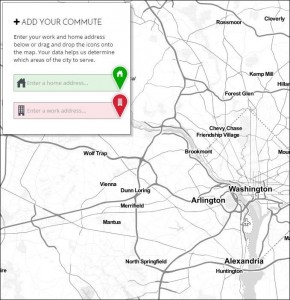
Bridj provides an interactive map of the Washington metro and invites visitors to plot the locations of their commutes. The data will help the company optimize its routes.
Last September, I posted about a Boston-area company, Bridj, that was reinventing the mass transit business by providing luxury bus rides to suburban commuters. For $6, Bostoners could get a comfortable, Wi-Fi-equipped ride from suburban locations to downtown Boston and Cambridge. Just as Uber was disrupting the taxicab industry, Bridj, I opined, would disrupt the bus transit industry.
Now Bridj is coming to the Washington region, the company has announced:
As the world’s first smart mass transit system, we deliver a fundamentally more efficient way of moving throughout the city. Powered by data and mobile tech, we’re able to optimize pick-ups, drop-offs, and routing based on need. Plus, since all rides are shared and each Bridj seats up to 14 passengers, fares cost only slightly more than the metro. However, on Bridj you’re always guaranteed a seat and an express trip between neighborhoods.
Our PhD-led data science team is developing our initial service area as we speak. Their algorithm takes into account dozens of different data streams on how D.C. moves, as well as feedback from potential users like yourself.
If Uber’s experience is any indication, Bridj will meet plenty of resistance from local transit monopolies who will complain about the company “skimming the cream,” threatening to drive them out of business, depriving poor people of transportation monopolies and all the rest. Hopefully, Virginia will respond to the Bridj challenge the same way it did to the Uber challenge with light-handed regulation tailored to safeguarding the public health and safety rather than protecting vested economic interests.
But Bridj may be savvier than Uber from a P.R. standpoint. I haven’t heard of any anti-Bridj backlash in the Boston area, so the company may be taking a less confrontational approach. Regardless, it would be nice to see the McAuliffe administration take a proactive stance, confer with Bridj executives and make the company’s transition to the Virginia marketplace as smooth and painless as possible. We should embrace the attitude that making Virginia a “Bridj friendly” state will confer a competitive economic advantage.
— JAB


